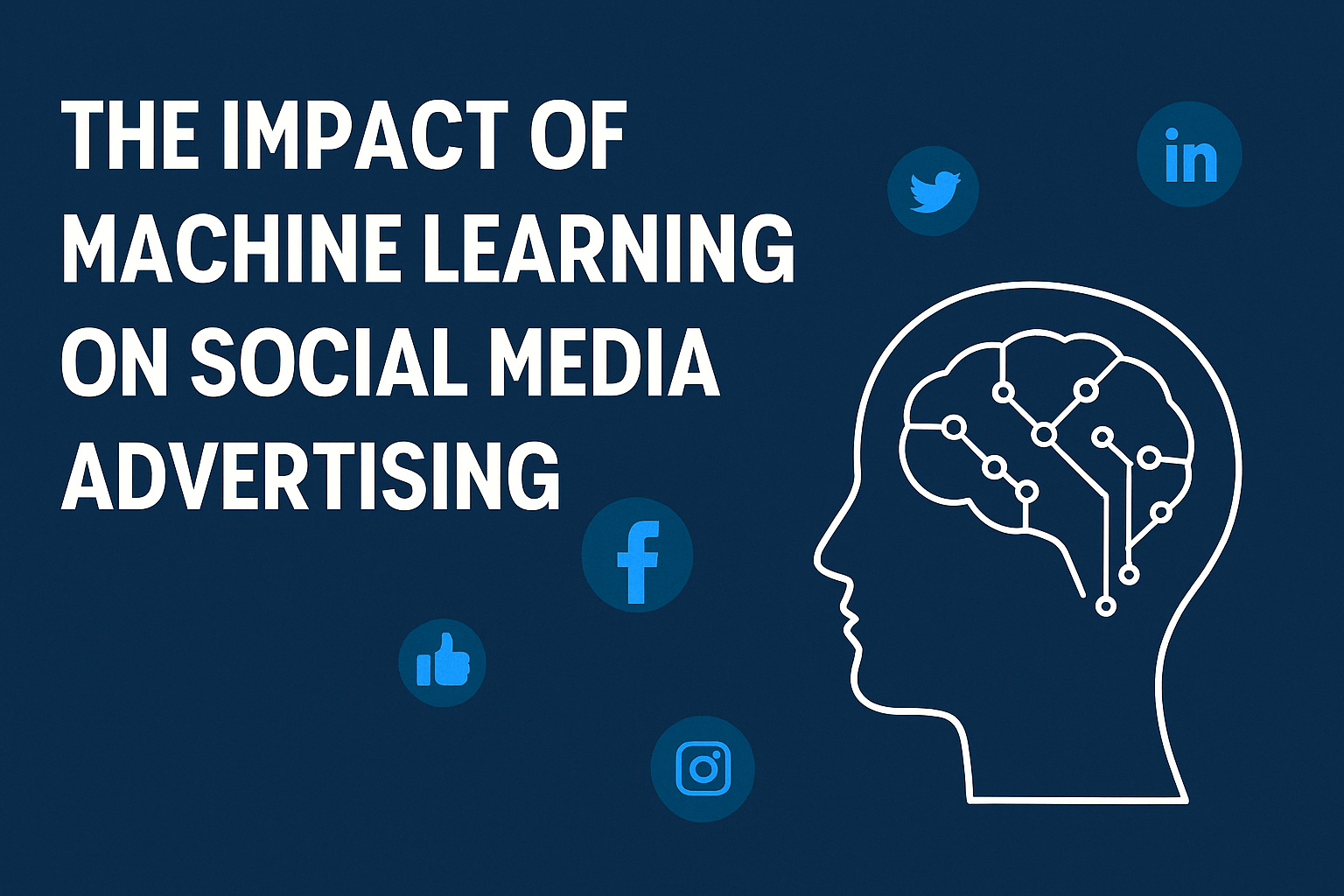The Impact of Machine Learning on Social Media Advertising

In today’s fast-paced digital world, businesses are increasingly dependent on data-driven strategies to reach their audiences. Among the most powerful innovations reshaping digital marketing is Machine Learning on Social Media Advertising. This advanced technology is revolutionizing how brands interact with users, optimize campaigns, and measure return on investment (ROI).
Social media platforms like Facebook, Instagram, LinkedIn, and Twitter process billions of data points daily. Without machine learning, managing this vast information would be nearly impossible. Through predictive analysis, real-time adjustments, and hyper-personalization, machine learning enables advertisers to create highly effective campaigns.
This article will explore the profound impact of machine learning on social media advertising, covering its benefits, challenges, and the future of AI-powered marketing.
What is Machine Learning in Social Media Advertising?
Machine learning (ML) is a subset of artificial intelligence that allows systems to learn and improve from data without being explicitly programmed. In the context of social media advertising, it refers to algorithms that analyze user behavior, preferences, demographics, and engagement patterns to optimize ad campaigns.
Instead of relying on guesswork, marketers use machine learning models to predict outcomes, segment audiences, and deliver relevant ads to the right people at the right time.
Why Machine Learning Matters in Social Media Advertising
The role of machine learning in social media is crucial because platforms are oversaturated with content. Every brand competes for attention, and traditional advertising methods no longer guarantee results. Machine learning ensures advertisements are more precise, impactful, and cost-effective.
Key reasons it matters:
-
Personalization: Ads are tailored to users’ interests and behaviors.
-
Automation: Campaigns self-adjust in real time.
-
Efficiency: Reduces manual effort and guesswork.
-
ROI Improvement: Maximizes conversion rates while minimizing ad spend.
Benefits of Machine Learning on Social Media Advertising
1. Enhanced Audience Targeting
Machine learning algorithms segment audiences far beyond basic demographics. They analyze browsing history, purchase behavior, and engagement to create hyper-specific user profiles. This allows advertisers to target niche groups with pinpoint accuracy.
2. Real-Time Campaign Optimization
Gone are the days of static campaigns. Machine learning enables real-time bidding (RTB) and optimization. If a particular ad creative is underperforming, ML instantly reallocates budget toward better-performing variations.
3. Predictive Analytics for Conversions
Machine learning forecasts which users are most likely to convert. Predictive models help marketers invest in high-probability leads instead of wasting money on uninterested audiences.
4. Content Personalization
Social media users prefer relevant and engaging content. ML customizes ad copy, visuals, and even product recommendations based on user interests. Personalized ads significantly increase click-through rates (CTR).
5. Fraud Detection and Brand Safety
Click fraud and fake accounts are major challenges in social media advertising. Machine learning systems identify unusual patterns and protect campaigns from fraudulent activity, ensuring safe and genuine engagement.
6. Cost Efficiency
By automating targeting and ad placements, machine learning ensures that budgets are spent wisely. The reduced cost-per-click (CPC) and improved ROI make it invaluable for small and large businesses alike.
Machine Learning Applications in Social Media Platforms
Different platforms apply machine learning uniquely:
-
Facebook Ads: Uses ML for audience insights, automated placements, and lookalike audiences.
-
Instagram Ads: Leverages ML to analyze visual engagement and predict user interaction with image-heavy content.
-
LinkedIn Ads: Employs ML to recommend B2B targeting strategies based on job roles, industries, and professional interests.
-
Twitter Ads: Optimizes real-time ad placements and trending topic targeting with ML-driven analysis.
-
TikTok Ads: Uses ML to understand video preferences, creating viral ad campaigns aligned with user interests.
Challenges of Machine Learning in Social Media Advertising
While the advantages are substantial, challenges exist:
-
Data Privacy Concerns: With rising regulations like GDPR and India’s DPDP Act, collecting and analyzing user data responsibly is critical.
-
Algorithm Bias: Machine learning models may unintentionally reinforce stereotypes if not carefully monitored.
-
High Competition: Since most brands use ML-powered tools, staying unique and creative is essential.
-
Dependence on Quality Data: Poor-quality or incomplete data can reduce the accuracy of machine learning predictions.
Case Studies: Success of Machine Learning in Social Media Ads
Case Study 1: E-Commerce Brand Boosts ROI
An online fashion retailer used Facebook’s ML-driven dynamic ads. By showing users products they had browsed, the brand saw a 30% increase in conversions and a 20% reduction in cost per acquisition.
Case Study 2: B2B Success on LinkedIn
A software company employed LinkedIn’s ML audience targeting to reach decision-makers. The campaign generated 40% more qualified leads compared to traditional targeting methods.
Future of Machine Learning on Social Media Advertising
The future is even more exciting, with emerging innovations set to further reshape the landscape:
-
Voice Search Integration: Ads optimized for voice-based queries will gain popularity.
-
AI-Powered Chatbots: Seamless customer engagement on social platforms.
-
Augmented Reality (AR) Ads: ML-driven immersive ad experiences.
-
Predictive Content Creation: Algorithms suggesting ad creatives that resonate with audiences.
-
Ethical AI: Stricter guidelines to ensure fairness and transparency.
As platforms evolve, machine learning will become more sophisticated, enabling advertisers to build trust, foster engagement, and drive sales at scale.
Best Practices for Using Machine Learning in Social Media Advertising
-
Leverage Lookalike Audiences: Expand reach by targeting users similar to existing customers.
-
A/B Test Continuously: Use ML tools to experiment with creatives and copy.
-
Prioritize Data Quality: Ensure clean, accurate, and updated data inputs.
-
Stay Updated on Privacy Laws: Comply with regional and global data protection regulations.
-
Invest in Creative Content: Machine learning works best when paired with strong visuals and messaging.
The impact of Machine Learning on Social Media Advertising is undeniable. From enhancing targeting precision to optimizing campaigns in real time, ML has transformed how brands connect with audiences. Businesses that embrace this technology gain a competitive edge, improved ROI, and stronger relationships with their customers.
As social platforms continue to innovate, machine learning will remain at the core of digital advertising success. For brands worldwide, adopting this technology is no longer optional—it’s essential.
